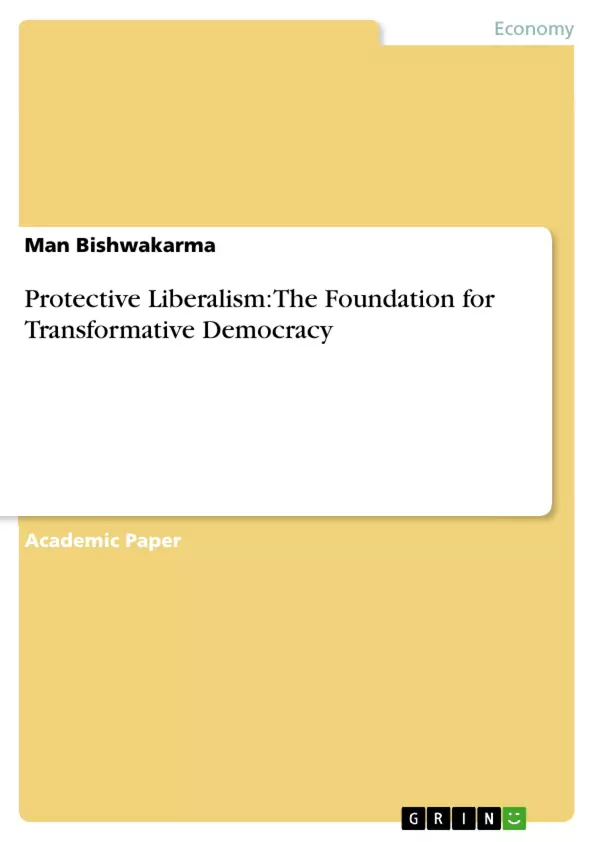Free market economy has never been in practice since the perfect competitive market is just an ideal situation. It is the economic creator of classes dividing human beings in different layers. The corporate regime came about with the neoliberal economic theory which is motivated by efficiency and trade liberalization. 'Supermarket revolution' for privileged consumers further constructed the division of farmers and consumers advancing 'new international division of labour'. Their economic power turns into the political power. The economic crisis was the result of neoliberal policy. It regenerated neoliberal atrocities and failed to improve human wellbeing at scale. State capitalism emerged as the alternative system: a compromise between competitive capitalism and socialism. However, it has several limitations. The protectionism stimulates left out people for economic growth. Egalitarian society from bottom to top is the basic part of the protective liberalism. It is neither anti-capitalism nor anti-socialism, rather the basic foundation for the transformative democracy.
Inhaltsverzeichnis (Table of Contents)
- Laissez-faire and the Free Market Economy
- Neoliberalism and the Corporate Regime
- The Economic Crisis and Neoliberal Atrocities
- The Rise of State Capitalism
- The Need for Protective Liberalism
- Transformative Democracy and Emancipatory Shift
Zielsetzung und Themenschwerpunkte (Objectives and Key Themes)
This text aims to analyze the shortcomings of neoliberal economic policies and the need for a new system that prioritizes human wellbeing and social justice. It explores the emergence of state capitalism as a potential alternative but highlights its limitations. The text then presents "protective liberalism" as a more sustainable and equitable economic model that forms the foundation for transformative democracy.
- The failures of free market and neoliberal economies
- The rise of inequality and economic crisis
- The limitations of state capitalism
- Protective liberalism as a more equitable and sustainable alternative
- Transformative democracy as a mechanism for social change
Zusammenfassung der Kapitel (Chapter Summaries)
- Laissez-faire and the Free Market Economy: This chapter analyzes the theoretical underpinnings of the free market economy and its inherent flaws, particularly the failure to address real-world complexities and the creation of economic classes. It critiques the idealization of the "invisible hand" and the disconnect between theory and practice.
- Neoliberalism and the Corporate Regime: This chapter explores the emergence of neoliberalism as a post-depression economic policy and its influence in shaping a global system driven by efficiency, trade liberalization, and corporate power. The text examines the role of "supermarket revolution" in creating a division between farmers and consumers and furthering the "new international division of labor."
- The Economic Crisis and Neoliberal Atrocities: This section analyzes the 2007-09 economic crisis as a direct consequence of neoliberal policies, emphasizing its impact on livelihoods, food security, and government budgets. The text discusses the negative social consequences of neoliberal policies, including increased poverty, land grabbing, and the displacement of farmers.
- The Rise of State Capitalism: This section examines the emergence of state capitalism as an alternative to the failings of neoliberal capitalism. While acknowledging its potential benefits, the text also points out its limitations, including inefficiencies, reliance on cheap capital, and potential for political favoritism.
- The Need for Protective Liberalism: This chapter argues for a shift toward a new economic system that prioritizes human wellbeing and sustainability. It introduces "protective liberalism" as a model that balances economic growth with social justice, emphasizing the need to move beyond the "winners take all" mentality of conventional democracy.
Schlüsselwörter (Keywords)
The text explores key concepts including free market economy, neoliberalism, state capitalism, protective liberalism, transformative democracy, inequality, economic crisis, and social justice. It examines the impact of these concepts on global economics, social structures, and human wellbeing.
Frequently Asked Questions
What is protective liberalism?
Protective liberalism is an economic model that seeks to balance market growth with social justice and human wellbeing, moving away from pure neoliberalism.
How does neoliberalism affect farmers and consumers?
Neoliberalism often leads to a 'supermarket revolution' that benefits privileged consumers but can marginalize small farmers through a new international division of labor.
What are the main failures of the free market economy?
The text argues that perfect competition is an ideal that doesn't exist in practice, leading to class division and economic crises like the one in 2007-09.
What is state capitalism?
State capitalism is an alternative system where the state plays a major role in the economy, though it has limitations like political favoritism and inefficiency.
Why is transformative democracy needed?
Transformative democracy provides the mechanism for social change and an egalitarian society, supported by the foundations of protective liberalism.
- Quote paper
- PhD Man Bishwakarma (Author), 2020, Protective Liberalism: The Foundation for Transformative Democracy, Munich, GRIN Verlag, https://www.grin.com/document/1045029



